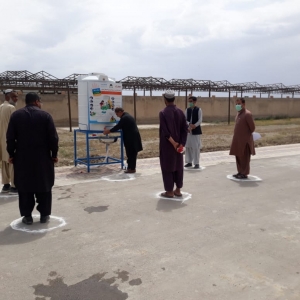This is Eileen Wray-McCann for Circle of Blue. And this is What’s Up with Water, your “need-to-know news” of the world’s water, made possible by support from people like you.
In the mountains of eastern Zimbabwe, an illegal gold rush is underway. Chimanimani National Park usually hosts tourists viewing waterfalls and rocky peaks, but Covid-related travel restrictions have emptied the reserve of visitors. In their absence, unlicensed, small-scale miners have moved in. According to Reuters news service, local observers say illegal mining is harming the mountain ecosystem, damaging springs, and poisoning rivers with sediments and toxic chemicals that separate gold from the ore. Activists and some miners also allege that national park rangers are facilitating the gold rush. A parks spokesperson said that the agency is investigating the claims and that most miners were evicted in August. Illegal activity in the park is part of a national trend in Zimbabwe. Amid economic recession, more and more people are working the land to find gold. The problem became so pronounced that the government banned most riverbed mining in September. Environmental groups say it is uncertain whether the ban will have any effect.
In research news, scientists at the University of Adelaide highlighted the many ways that drought threatens the world’s wetlands. Those threats are playing out today in southern Brazil where the world’s largest tropical wetland system, the Pantanal, has been burning for months in record-setting fires. A quarter of the Pantanal has been scorched since July, according to the Associated Press. That’s an area equal in size to the state of Maryland. Though the Pantanal ecosystem is adapted to periodic fires, the region is having its worst dry spell in almost 50 years, which has helped to fuel the blazes. Fires are the most vivid consequence of drought for wetlands. But they are not the only effect. The University of Adelaide researchers describe a range of other negative outcomes. Drying soils can loosen metals in the sediments that degrade water quality. Prolonged drought can cause wetland soils to compact and lose some of their capacity to store water. Wetlands also store carbon and give shelter to a host of plant and animal species. There could be other impacts, as well. The research team says there needs to be more scientific investigation into the consequences of drought on wetlands because many regions of the world lack this information.
A new report from the International Rescue Committee found that 31 percent of women in 15 African countries reported incidents of harassment and sexual violence while collecting water. Hygiene precautions during the coronavirus pandemic have increased the need for water. The burden of collecting it generally falls to women and girls. Schools have also closed, pushing more young girls into water collection responsibilities. The IRC report included a safety audit, in which women suggested ways to protect themselves and girls from the dangers associated with collecting basic needs. They included installing more water and sanitation service points to reduce the frequency of water collection, and direct delivery of non-food items such as water, masks, and gloves.
This week Circle of Blue reports on how the CARES Act is playing a part in addressing the ongoing problem of customer water debt.
In Michigan, residents who are behind on their water bills will soon be getting some relief. The Michigan Department of Health and Human Services will provide over $20 million to 116 water utilities, through an intermediary. The money is intended to cover water bill debt that utility customers accrued since March 1 when the pandemic emergency began. The debt-relief measure draws from Michigan’s share of the federal CARES Act funding. The $2.2 trillion emergency package that Congress passed in late March included $150 billion in aid to state governments.
Though the number of customers with overdue water bills is rising because of the pandemic, many states have had difficulty using CARES Act funds to assist these people. The U.S. Treasury Department says that the money cannot be used to cover government revenue shortfalls. So states using the CARES funds have to be selective in applying them, depending on the how their utilities and programs are structured.
For example, Vermont’s $8 million utility-assistance program uses money from the CARES Act. So it is limited to customers of investor-owned utilities. Customers of municipal water departments are excluded. In North Carolina, the bill assistance program with CARES Act funds is available to renters but not homeowners.
Other states are interpreting the guidance more broadly. This July, the Michigan Legislature decided that it was acceptable to include assistance to customers of municipal water utilities. Lawmakers authorized $25 million of the state’s CARES Act funds for relieving the financial burden of unpaid water bills due to the pandemic. The goal was to keep water flowing to households during a public health emergency. Lawmakers required residents to meet certain criteria to qualify for debt forgiveness: they had to be eligible for food assistance benefits and their past-due balances had to have accrued after March 1. Customer debts that existed before the pandemic were not eligible for forgiveness.
The Michigan Department of Health and Human Services worked with community groups and utilities to identify qualified residents. Bob Wheaton, a spokesman for the Department, said that as of October 8, it found qualified recipients for over $20 million in payments. Those payments will be funneled to utilities through the community groups. The utilities will then notify those customers, who will see a credit on their bills toward their debt.
The remainder of the debt-relief funds that lawmakers approved is not intended to sit idle. Wheaton said that utilities and community agencies will continue with local outreach efforts to find others who may be eligible.Wheaton told Circle of Blue that the Michigan Department of Health and Human services sees this as a chance to work directly with low-income households, using a walk-in process to determine eligibility, while the remaining funds last. The debt-relief is limited to $700 per customer account for water and $700 per customer account for sewer.
The legislation that authorized the funds had other items that will not will not carry forward. There had been a plan for a 25 percent discount on water and sewer bills for eligible customers through the end of the year. But Wheaton said that after the direct payments there will not be enough money left for that.
The largest amount of funding will go to the Detroit Water and Sewerage Department, the utility that serves the state’s largest city. The Department will receive almost $10 million. Other utilities that will receive more than a million dollars include Flint and Saginaw. Some of the distributions are tiny – Chassell Township, home to fewer than two thousand people, will receive about $230.
The debt-relief funds are one of several ways that Michigan lawmakers have responded to household water needs during the pandemic. In March, Gov. Gretchen Whitmer ordered water utilities to restore water service to homes where it had been disconnected because of overdue bills, and she prohibited utilities from disconnecting water service. Whitmer’s executive orders, however, were invalidated by the Michigan Supreme Court on October 12.
The Department of Health and Human Services is also using coronavirus funding to repair faulty plumbing, water wells, and septic systems. That funding is available through December 30.
And that’s What’s Up With Water from Circle of Blue, which relies on your support for independent water news and analysis. Please visit
circleofblue.org and make a difference through your tax-deductible donation.






